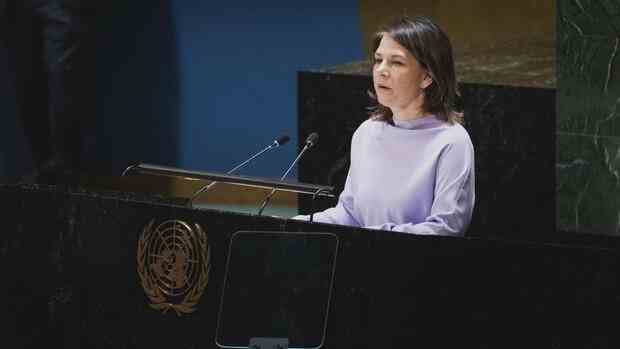Berlin, Washington The German federal government had campaigned for every supporter on the world stage, and the breakthrough came on Thursday: the General Assembly of the United Nations passed a resolution on Ukraine, which was introduced at the initiative of Germany, among others.
Shortly before the anniversary of the start of the war, representatives of the member states debated the consequences of the Russian invasion. The resolution passed with 141 votes. There were seven votes against and 32 abstentions. The last Ukraine resolution in October last year had 143 yes votes, so this time the support was a bit weaker.
In addition to Russia, Belarus, Syria, North Korea, Eritrea, Mali and Nicaragua also voted against the resolution. Among the abstentions were China and South Korea.
In contrast to resolutions of the UN Security Council, resolutions of the General Assembly are not binding and are primarily of a symbolic nature. But they are an indicator of how strongly the international community is sticking together in the Ukraine war.
The resolution, which was initiated by a total of 50 countries, calls for “a comprehensive, just and lasting peace in Ukraine in accordance with the principles of the United Nations Charter”. Russia must withdraw from the territory of Ukraine. The document also calls for the prosecution of war crimes. The resolution does not detail how peace or peace negotiations might be achieved.
Baerbock makes demands on China
At her own request, Federal Foreign Minister Annalena Baerbock (Greens) was the last regular speaker in the General Assembly on Thursday in order to be able to conclude the debate. In the past few weeks, the minister had campaigned intensively for the votes of other countries, for example at the Munich Security Conference.
“We have a peace plan right here in front of us,” Baerbock told the UN, “it’s the United Nations Charter.” China and others have repeatedly accused the US and Europe of “pouring fuel on the fire” with their arms deliveries to Ukraine. Baerbock rejected these allegations in her speech. “Why should we do that?” she said.
“We didn’t want this war.” The allies would much rather invest their time and money in schools, for social justice and the fight against the climate crisis, says Baerbock. “If Russia stops fighting, the war will end. If Ukraine stops fighting, Ukraine will end.”
More on the subject:
Before leaving for New York, she had called on Russia to withdraw immediately from Ukraine. “What the global community is asking for couldn’t be simpler. Stopping Russian attacks, protecting the civilian population, respecting the territorial integrity of Ukraine through the withdrawal of Russian troops, accountability for the crimes committed.” This is the path to peace and the world has been expecting this from Russia for a year.
On the fringes of the General Assembly, the Foreign Minister called on China to follow up on its announcements with action. At the Munich Security Conference, China’s top foreign policy leader, Wang Yi, announced a kind of peace plan for Ukraine, which is expected to be presented on Friday. Observers assume that this peace plan will not take Kiev’s interests into account.
China must submit its peace plan under the umbrella of the UN Charter, the Foreign Minister demanded from Beijing. This is necessary because China, as a member of the UN Security Council, not only has veto rights, “but as a member has a special responsibility to restore world peace”.
According to Baerbock, “the easiest way would be for China to support the United Nations Charter, to recognize the right to self-defense and, above all, to make it clear to Russia that the ban on the use of force applies to all countries in the world”.
On Thursday, Wang Yi visited Russian President Vladimir Putin and assured that China-Russia relations are “stable as a mountain”. There is concern in Europe and the US that China is considering supplying arms to Russia, in addition to verbal and economic support.
Russia raises allegations against Germany
The divisions of the international community became clear during the special session. Hungarian Foreign Minister Peter Szijjarto, for example, appealed to western countries to put more effort into peace negotiations instead of either arming Ukraine or sanctioning Russia. Belarus tried to the last to weaken the wording of the resolution.
China’s Deputy Ambassador to the United Nations Dai Bing said peace talks should be the priority of the international community. Ukrainian President Volodymyr Zelenskiy warned from Kiev against pressuring his government into peace negotiations. That would only spur Russia to continue its aggression and attack other countries as well, he said. Ukrainian Foreign Minister Dmytro Kuleba said in New York that Russia’s resettlement of Ukrainian children amounted to “genocide”.
Russia’s UN Ambassador Vasily Nebensia accused NATO of aggravating the conflict and drew parallels with the Second World War. “This is a war involving, as was the case 80 years ago, treacherous and powerful enemies who want to take over our country and subjugate us,” he told the General Assembly, addressing Germany: “German tanks are killing Russians again,” he said he alluded to German Leopard battle tanks.
Baerbock defended the tank deliveries. None of the global appeals have persuaded Russian President Vladimir Putin to rethink. “Therefore, what we can do to protect people in Ukraine from further murder, rape and torture is also to supply arms.”
The UN Security Council will meet on Friday, in which China is represented as a permanent member alongside Russia. The body has held dozens of meetings on Ukraine since the war broke out, with no results as Russia and China block decisions.
The international reaction to the Ukraine war has largely shifted to the larger General Assembly because individual states cannot veto it there.
More: Base for soldiers, hub for weapons – Why the US is rediscovering Poland
